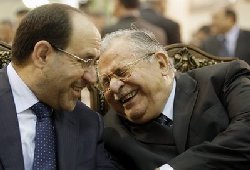Iraqi politicians have broken an eight-month political impasse by agreeing to take part in a new government headed by Nouri al-Maliki, the incumbent prime minister.
Officials said on Wednesday that the Sunni-backed Iraqiya coalition that had been opposing the prime minister decided to join his government.
Iraqiya joins a Kurdish alliance in supporting al-Maliki following months of contentious negotiations.
"Finally, fortunately, it's done. It's finished. All the groups are in it,'' Mahmoud Othman, a Kurdish politician who took part in the nearly seven hours of negotiations, said.
Ali al-Dabbagh, a government spokesman and member of al-Maliki's State of Law coalition, said Iraqiya had decided after extensive talks to accept the parliament speaker's job and cede al-Maliki the prime minister's job.
An official with Iraqiya, who asked not to be identified, confirmed that the coalition had agreed to take the parliament speaker's position in a deal that would see al-Maliki stay on for another four years.
Iraqiya will decide on a nominee from the party for speaker of parliament at a meeting on Thursday, which will be just the second parliamentary meet since an inconclusive election on March 7.
Iraq has been without a government since the vote, which gave Iraqiya two more seats than al-Maliki's bloc. Neither had enough for a majority in parliament, forcing the factions to negotiate a government.
Repeated rejection
Over the past months, Iraqiya had repeatedly rejected another al-Maliki term and demanded the right to form the government as the top vote winner in the election.
Politicians from al-Maliki's National Alliance said they would proceed with government formation as long as they had a political majority - even if other blocs chose to boycott Thursday's parliamentary session.
Parliament met briefly in June, but politicians said they needed more time to decide who would hold the highest offices.
Last month, Iraq's high court ordered parliament to resume its sessions, putting pressure on politicians to expedite a deal.
The long deadlock has fuelled tension - even as sectarian violence that came after the 2003 US-led invasion has been receding - while US forces prepare to withdraw in 2011.
PHOTO CAPTION
Iraq's Prime Minister Nouri al-Maliki, left, and President Jalal Talabani, right, react, at a ceremony marking the 2003 death of Mohammed Baqir al-Hakim in Baghdad, Iraq.
Al-Jazeera


 Home
Home Discover Islam
Discover Islam Quran Recitations
Quran Recitations Lectures
Lectures
 Fatwa
Fatwa Articles
Articles Fiqh
Fiqh E-Books
E-Books Boys & Girls
Boys & Girls  Ramadan
Ramadan Fatwa Audios
Fatwa Audios Month of Mercy
Month of Mercy Women
Women Eed Al- Fitr
Eed Al- Fitr Food Recipes
Food Recipes Videos
Videos

 Prayer Times
Prayer Times












